About Tokyo Tech
About Tokyo Tech
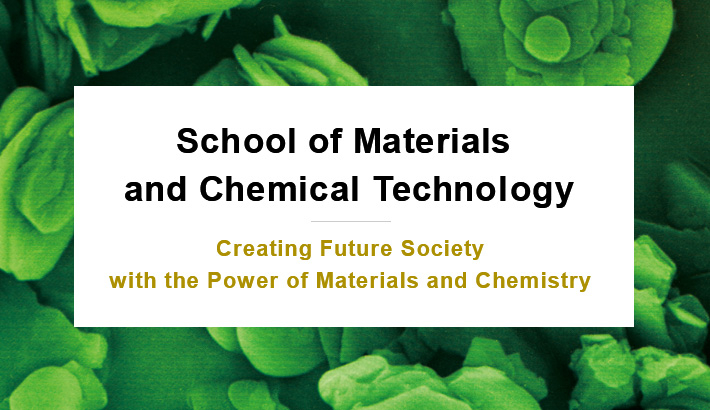
Tokyo Tech boasts a world-class research team in the fields of materials and applied chemistry, and has achieved outstanding results to date. The School of Materials and Chemical Technology contributes to creating future society through developing novel materials useful in solving society's problems related to the environment, resources, energy, and health and medicine, as well as improving the quality of our lives. In particular, we aim to realize a carbon-neutral society, which is important for the Sustainable Development Goals (SDGs). The School is composed of the Department of Materials Science and Engineering, which focuses on studying solid materials, and the Department of Chemical Science and Engineering, which focuses on molecules and chemistry, and covers a wide range of subjects from atoms and electrons to devices and plants. We also promote innovative material development integrated with information science. Through such cutting-edge research, we foster global researchers and engineers who can lead the development of materials in the future.
![]()
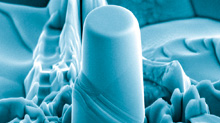
Experience the joy of discovering new materials and possibilities.
University research aims for breakthroughs that lead to the discovery of never-before-seen materials and substances. When you discover a novel substance, you come to appreciate this research and its impact on society.
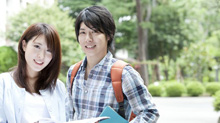
Finding a field that matches your interests is easy, and your future options open up.
There is great diversity in substance and materials research, with everything from science to engineering topics. That is why substance and materials professionals are needed in all sorts of sectors, such as cars, machines, electrical devices, textiles, medicine, and energy.

This field is connected to key industries, so you do not need to worry about not finding a job.
In addition to plentiful options, this field is connected to areas crucial to Japanese industry, where many of our graduates are enjoying great success. It is fair to say that if you study hard, you will not have a problem finding a job — another benefit to studying at the School.
School of Materials and Chemical Technology |
1st year of bachelor's program |
Undergraduate Major (undergraduate study year 2–4) |
Graduate Major |
|---|---|---|---|
School of Materials and Chemical Technology |
|||
* Interdisciplinary graduate majors connected to multiple departments

As university education is rapidly globalizing, the School of Engineering, the School of Materials and Chemical Technology, and the School of Environment and Society are focusing on creating international research networks to support participation in projects and encourage exchange among students, faculty, and researchers. More than 50 school-level agreements have been concluded with top-level universities around the world, and international exchange programs with scholarships from Engineering School Funds are being implemented with some of those universities. In addition, Erasmus+ will provide financial assistance to students wishing to study at relevant partner universities with which international exchange agreements are in place.
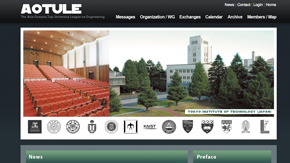
The Asia-Oceania Top University League on Engineering (AOTULE) is a university league established for the purpose of promoting multilateral exchange between 12 leading engineering universities in Asia and Oceania. Its activities include international student conferences, workshops held at Tokyo Tech as well as various other regions in Asia and Oceania, and overseas placements to conduct research.

Support is provided for students to study abroad for two to three months at partner universities based on school-to-school agreements in engineering fields.Current partner universities include University of Wisconsin–Madison; University of California, Santa Barbara; University of Cambridge; University of Oxford; University of Warwick; University of Southampton; Pierre and Marie Curie University (UPMC, University of Paris VI); RWTH Aachen University; and Technical University of Madrid (UPM).
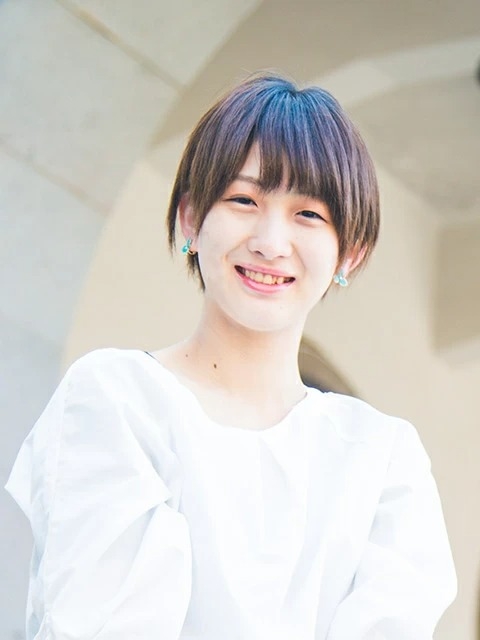
A Fascinating Look into Materials Science at the Atomic Scale
Rurika Kubota
3rd-year bachelor's student, AY 2018
Department of Materials Science and Engineering, School of Materials and Chemical Technology
My concept of solids was pretty obscure when I first started studying my discipline. However, by taking a look at solids at atomic and molecular levels, I have been able to grasp their nature and see the potential of materials development. Furthermore, learning about the theoretical derivations of material properties and how they have changed over time made me appreciate the long history of my discipline's scientific endeavor. When I graduate, I hope to get involved in developing new materials and improving manufacturing processes.
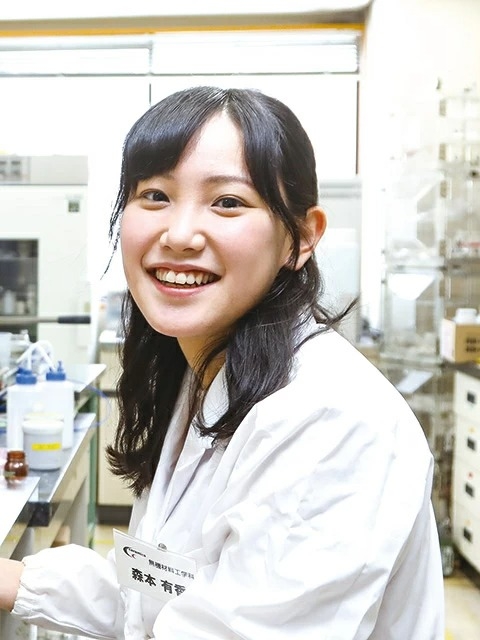
Tokyo Tech is Full of Attractive Options such as Studying Abroad and Leadership Training
Yuka Morimoto
1st-year master's student, AY 2017
Department of Materials Science and Engineering, School of Materials and Chemical Technology
I really had a love for physics, and initially entered the First Academic Group of the School of Science, but then I felt that the School of Engineering was better for studying practical matters. Some more re-thinking led me to transfer to the Department of Inorganic Materials in the Second Academic Group, in which I was leaning toward physics as it also covers studies about the environment and energy. One advantage of Tokyo Tech was that it allowed me to decide after the first year whether the department I selected was a good fit, or whether I wanted to change to another in the second year. Once I entered the Department of Inorganic Materials, I delighted in learning about materials and mechanisms close at hand, like electronic materials, glass, and metals, as well as energy and the environment. In my research, I focus on the preparation of new substances to improve electrical characteristics by substituting oxygen with nitrogen in materials used for capacitors. I find many people at Tokyo Tech are genial, and the professors are passionate in their support. Another part of Tokyo Tech's appeal is the emphasis on pedagogy for capable, talented individuals around the world. Certain classes train people in leadership, and native English-speaking professors provide instruction in English. There are many opportunities to meet international students, with many places provided for social interaction.
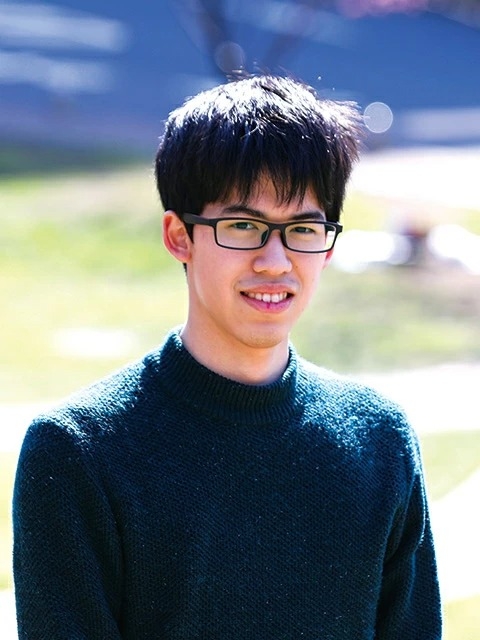
CNF-Reinforced Composite Materials and Research to Elucidate Reinforcement Mechanisms
Yuta Sekiguchi
2nd-year master's student, AY 2017
Department of Materials Science and Engineering, School of Materials and Chemical Technology,
Cellulose-nanofiber (CNF) reinforced composite materials have garnered a lot of interest in recent years, and are expected to be effective in solving environmental issues. Through structural analysis and physical properties evaluation, I look at reinforcement mechanisms of fibers created with high-speed melt spinning of resin containing CNF. Detailed theoretical analysis, which was previously difficult to do, has become possible for composite materials with the creation of their fibers. I find it interesting that we now have the ability to elucidate these reinforcement mechanisms.
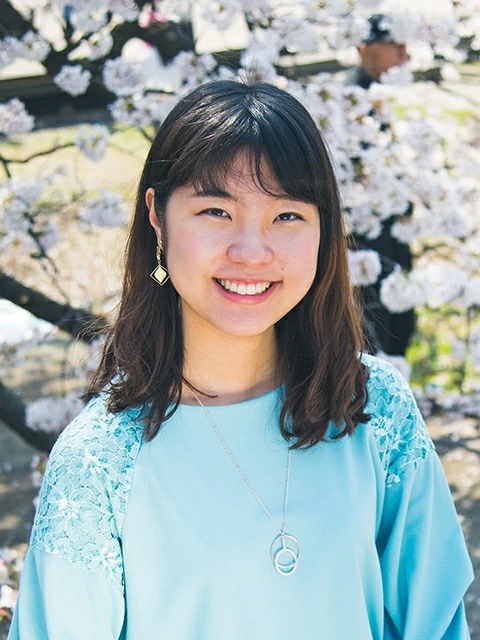
Making a Difference in People's Lives with Innovative Monozukuri
Atsuko Tabuchi
3rd-year bachelor's student, AY 2018
Department of Chemical Science and Engineering, School of Materials and Chemical Technology
My major offers a lot of courses in polymers. Learning about polymer reaction processes has enabled me to gain insight into the properties and regularity of polymers and to deepen my understanding of polymeric materials that are found in everyday life. When I first started university, I only had a vague idea of what chemistry is, but that has since changed through taking the wide range of courses that are available. I have now found a field in which I am interested. After furthering my studies in foundational fields, I intend to go on to do cutting-edge research.
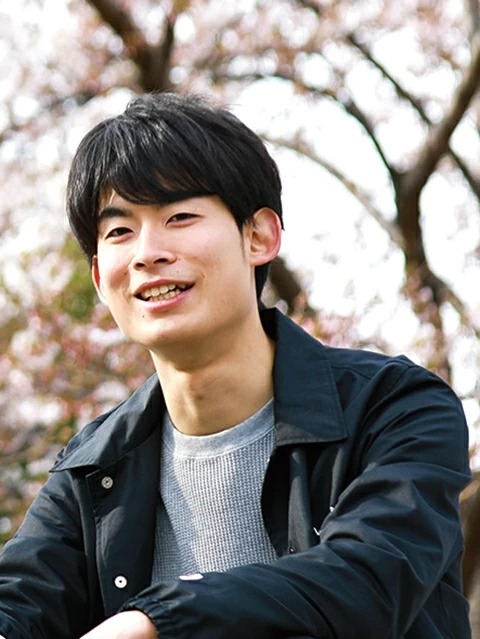
Research Gets Interesting when Microstructures of Polymers can be Elucidated
Junpei Kuribayashi
1st-year master's student, AY 2017
Department of Chemical Science and Engineering, School of Materials and Chemical Technology,
My research involves ABA triblock copolymers containing liquid-crystalline polymers, and their micro phase-separation structures. Copolymers form microstructures that were previously unknown due to the competition between properties of the liquid crystal that prefer to order themselves in alignment and properties of the polymers that prefer a random state. I find it extremely interesting to clarify how their microstructures, which are too small to be seen, are formed based on their polymer characteristics, X-ray measurements, and other analyses.
Students - 1,976
Faculty - 164
* Number of students and faculty members are as of May 1, 2022.
Click below for the list of School of Materials and Chemical Technology faculty.
<Undergraduate Degree Program>
First-Class Teaching Certificate for Lower Secondary School(Science)
First-Class Teaching Certificate for Upper Secondary School(Science, industry)
<Master's Degree Program>
Advanced Class Teaching Certificate for Lower Secondary School(Science)
Advanced Class Teaching Certificate for Upper Secondary School(Science, industry)